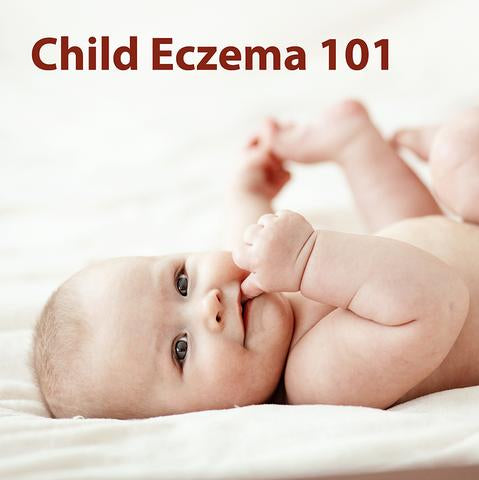
Child Eczema 101
Share

What is eczema?
Eczema, or atopic dermatitis, is a skin rash that usually appears on children before age 5. In babies it tends to show up on the cheeks and scalp, but it may spread to the arms, legs, chest, or other parts of the body.
The rash might look like dry, thickened, scaly skin, or tiny red dumps that ooze or become infected if scratched.
Eczema typically comes and goes. It isn't contagious; but because it's intensely itchy, it can be very uncomfortable.
There's no way to know ahead of time whether a child will outgrow eczema, but fortunately the condition usually becomes less severe with age. Many children outgrow eczema by age 2, and many others outgrow it by adulthood.
What causes eczema?
No one knows for sure what causes it, but the tendency to have eczema is often inherited. So your child is more likely to have it if you or a close family member has had eczema, asthma, or allergies.
Eczema is not an allergic reaction to a substance, but allergens or irritants in the environment (such as pollen or cigarette smoke) can trigger it. It can be triggered by allergens in your child's diet - or in your diet if you are breastfeeding.
The rash can also be aggravated by heat, irritants that come in contact with the skin (like wool or the chemicals in some soaps, fragrances, lotions, and detergents), changes in temperature, and dry skin. Stress can also trigger a flare-up of eczema.
How to treat eczema?
Taking good care of your child's skin and avoiding triggers can help treat and prevent flare-ups.
Bathing & Moisturizing
Ask a specialist about how often to bathe your child. Many experts now believe that daily bathing can be helpful for children with eczema. Ensure the water is not too warm, because very warm water dries out the skin faster than lukewarm water.
Use mild and safe cleansers, and wash and shampoo your child at the end of the bath so your kid isn't sitting in soapy water. As soon as you get your child out of the tub, pat dry excess water from the skin with a soft towel or washcloth.
Then apply a liberal amount of heavy moisturizer - an ointment, cream, or lotion. These moisturizers contain more emollient and less water and are usually best for children with eczema.
At DermaMed TM we care a lot about tiny people with sensitive skin and eczema. Nutrient rich, hypo-allergenic and full of natural botanical extracts and essential oils, our baby skin care products provide gentle moisturizing, nourishing and soothing properties. These cleansers, body lotions and creams are free of harsh chemicals, fragrances and colorants, making them perfect for sensitive skin.
Our Organic Baby Natural Specialty Cream for Infants & Children soothes and protects the delicate skin of infants and children with pure herbal extract of Calendula. Especially effective for diaper rash, eczema, rashes and hives, Natural Specialty Cream for Infants and Children calms irritated skin and helps speed healing.
Allowing skin to breathe and stay cool
Dress your child in smooth natural fabrics, like cotton. Avoid any scratchy materials, which can irritate sensitive skin.
Soaps & Shampoos
Switch to natural, fragrance- and colorant-free cleansers. Our Baby Specialty Shampoo was designed to gently and effectively cleanse and moisturize baby's delicate hair and skin. No harsh chemicals, artificial fragrances or colorants - it's safe for kids suffering from eczema.
Also use mild, fragrance-free detergent for washing clothes and bedding. Don't use fabric softeners.
Prevent scratching
Your child may try to get relief by scratching, but scratching and rubbing can further irritate or inflame the skin and make matters much worse.
Use the softest sheets possible in the crib or bed, and keep your child's nails short. Put your baby to bed with cotton mittens or socks on the hands to prevent scratching.
Talk to your doctor if the rash doesn't get better. Researchers are developing new drugs to help eczema suffers, so if your child continues to struggle with the condition, ask the specialist to keep you up-to-date on appropriate remedies.
